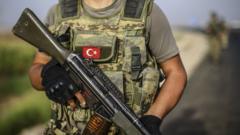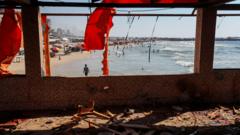In a momentous event, the PKK has declared its intention to disarm, aiming to transition from armed struggle to peaceful politics while garnering diverse reactions from the region.
**Historic Move: PKK Announces Disarmament in Bid for Peace with Turkey**

**Historic Move: PKK Announces Disarmament in Bid for Peace with Turkey**
Kurdish militants take a significant step towards ending decades of conflict with the Turkish government.
The month of June marks a pivotal moment in the decades-long conflict between the Kurdish PKK and the Turkish state, as the PKK publicly announces its intention to lay down arms in a ceremonial act anticipated to foster peace. After 40 years of bloodshed resulting in over 40,000 deaths, this move represents a potential turning point for Turkey, Iraq, and neighboring regions that have felt the repercussions of this conflict.
A symbolic disarmament ceremony is set to take place in Suleymaniyah, Iraqi Kurdistan under strict security measures, with the attendance of selected pro-Kurdish Turkish political figures. The specifics of the location are undisclosed, citing security concerns. The disarmament process will unfold over the summer, with sites established in collaboration with Turkish, Iraqi, and regional governments.
Abdullah Ocalan, the imprisoned leader of the PKK, remains a significant figure within this narrative. Through a recent video message, Ocalan urged the group to commit to a transition from violence to democratic engagement, stating that the time has come for "democratic politics and law." He has been in solitary confinement since his capture in 1999, yet he still commands a substantial following among Kurds.
Notably, this disarmament could evoke complex reactions across the political spectrum. The PKK has a storied history rooted in Marxism and the pursuit of Kurdish autonomy. Its initial objectives morphed over time to advocate more for political rights and recognition rather than outright independence. Previous peace attempts, including a ceasefire in 2013 and the 2015 Dolmabahce Agreement, have failed amidst rising tensions and violations from both sides.
This latest development follows extensive negotiations led by Turkey's nationalist leader, Devlet Bahceli, who publicly called for a terror-free policy approach. Political dynamics are set to shift as legislators and President Recep Tayyip Erdogan now contemplate the future of both the PKK and Ocalan during parliamentary sessions that are likely to hold significant implications for all parties involved.
The implications of this disarmament reach beyond mere cessation of conflict. Erdogan's government pushes for constitutional changes that might enable him to run for presidency again in 2028 while leveraging potential support from the pro-Kurdish Dem party. While Erdogan maintains a precarious political foothold, opposition dynamics add layers of complexity to the evolving peace narrative in Turkey.
Overall, the future remains uncertain as both the PKK and Turkish government navigate their roles in this budding peace process. As disarmament ceremonies commence, the question of what follows for Abdullah Ocalan and the broader Kurdish populace remains to be seen.
A symbolic disarmament ceremony is set to take place in Suleymaniyah, Iraqi Kurdistan under strict security measures, with the attendance of selected pro-Kurdish Turkish political figures. The specifics of the location are undisclosed, citing security concerns. The disarmament process will unfold over the summer, with sites established in collaboration with Turkish, Iraqi, and regional governments.
Abdullah Ocalan, the imprisoned leader of the PKK, remains a significant figure within this narrative. Through a recent video message, Ocalan urged the group to commit to a transition from violence to democratic engagement, stating that the time has come for "democratic politics and law." He has been in solitary confinement since his capture in 1999, yet he still commands a substantial following among Kurds.
Notably, this disarmament could evoke complex reactions across the political spectrum. The PKK has a storied history rooted in Marxism and the pursuit of Kurdish autonomy. Its initial objectives morphed over time to advocate more for political rights and recognition rather than outright independence. Previous peace attempts, including a ceasefire in 2013 and the 2015 Dolmabahce Agreement, have failed amidst rising tensions and violations from both sides.
This latest development follows extensive negotiations led by Turkey's nationalist leader, Devlet Bahceli, who publicly called for a terror-free policy approach. Political dynamics are set to shift as legislators and President Recep Tayyip Erdogan now contemplate the future of both the PKK and Ocalan during parliamentary sessions that are likely to hold significant implications for all parties involved.
The implications of this disarmament reach beyond mere cessation of conflict. Erdogan's government pushes for constitutional changes that might enable him to run for presidency again in 2028 while leveraging potential support from the pro-Kurdish Dem party. While Erdogan maintains a precarious political foothold, opposition dynamics add layers of complexity to the evolving peace narrative in Turkey.
Overall, the future remains uncertain as both the PKK and Turkish government navigate their roles in this budding peace process. As disarmament ceremonies commence, the question of what follows for Abdullah Ocalan and the broader Kurdish populace remains to be seen.




















